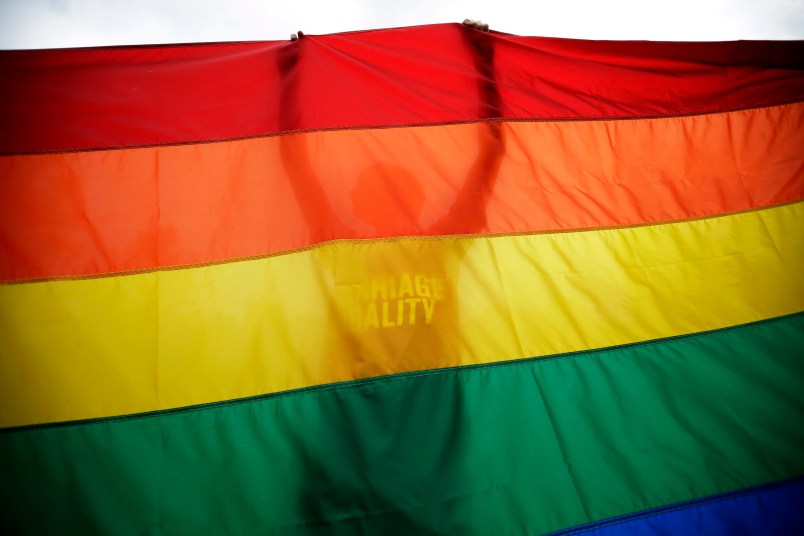INDIANAPOLIS (AP) — Opponents of an effort to place Indiana’s gay marriage ban in the state constitution won a surprising victory Thursday as the Senate effectively pushed off a statewide vote on the issue for at least two years, and possibly longer.
In a parliamentary move that spared state senators a tough vote on the measure, the Senate advanced the marriage ban without the “second sentence” ban on civil unions. The House stripped that language from the amendment before passing it last month, and the Senate’s decision not to restore the language before voting Thursday means the effort to amend the constitution must start fresh.
Even if Indiana’s marriage ban clears the Senate on a final vote Monday, it would have to be debated again in the next biennial session, 2015-16, before it could appear before voters.
Senate President Pro Tem David Long, R-Fort Wayne, said many lawmakers sensed that the final say on the issue ultimately will be made by the U.S. Supreme Court. A federal court ruling this week that Kentucky must recognized same-sex marriages performed in other states was weighed in private discussions among Senate Republicans, and Long said he could sense momentum building for a high court ruling.
“In reality, I think the issue is going to be before the United States Supreme Court — as I’ve said before — and it’s either going to be a state’s rights issue and each state decides for itself or it’s going to be decided by the Supreme Court that it’s a violation of the 14th Amendment,” Long said. “One way or another they’re going to have the final say in this because the U.S. Constitution trumps a state constitution.”
Indiana’s gay marriage battle was playing out as federal courts in Oklahoma and Utah overturned constitutional bans and New Mexico’s high court overturned that state’s marriage ban.
The state Senate’s decision caps a sharp turnabout in Indiana, where just three years ago the constitutional ban passed the General Assembly with overwhelming majorities. But national attitudes on gay marriage have shifted sharply, and opponents of the ban were able to build a strong coalition that lobbied Indiana lawmakers heavily — privately and in public.
Indiana’s gay marriage battle also opened a rift among Republicans in the solidly conservative state. Pro-business conservatives, including many who had worked closely with former Gov. Mitch Daniels, largely lined up against the marriage ban. While social conservatives, mostly aligned with Republican Gov. Mike Pence, fought hard to shepherd the ban to the 2014 ballot.
Some of the Republican Party’s strongest fundraisers, including former George W. Bush economic adviser Al Hubbard and former Indiana Republican Party Chairman Jim Kittle, opened their wallets for Freedom Indiana, the umbrella organization opposing the marriage ban.
“Six months ago, if you’d said lawmakers would refuse to put this issue on the ballot in 2014 by stripping out the deeply flawed second sentence, I’d have said there’s no way,” said Megan Robertson, Freedom Indiana campaign manager and a veteran Indiana Republican operative.
The author of a proposal that would have restored the civil unions ban and place the constitutional ban back on track for a November referendum bemoaned the fact that he could not find enough support among Republican senators.
The ban’s “second sentence is officially dead in the 2014 IGA. Not enough support to reinsert it on 2nd reading,” Sen. Mike Delph, R-Carmel, wrote on Twitter. Long later chided Delph for discussing a private meeting of the Indiana Republicans.
When the constitutional ban came up for consideration Thursday, Lt. Gov. Sue Ellspermann — who presides over the Senate — asked lawmakers if they had any amendments. The Senate chamber was silent, as were hundreds of activists just outside the Senate who had been chanting and singing just minutes earlier.
Ellspermann then acknowledged she had heard no amendments to the measure, and declared it ready for a final vote later in the Senate. Thursday was the last day lawmakers could have altered the measure and put it back on track for a November vote.
Delph later said he did not seek a vote on restoring the “second sentence” civil unions ban because he knew it would fail.
Supporters of the ban say it is needed to prevent courts from overturning Indiana’s law defining marriage as between a man and a woman. But they struggled to find their footing after House lawmakers stripped the civil unions language.
Pence lobbied for a November vote on the ban in his State of the State address and at a rally of ban supporters, but later said he was removing himself from the legislative debate.






